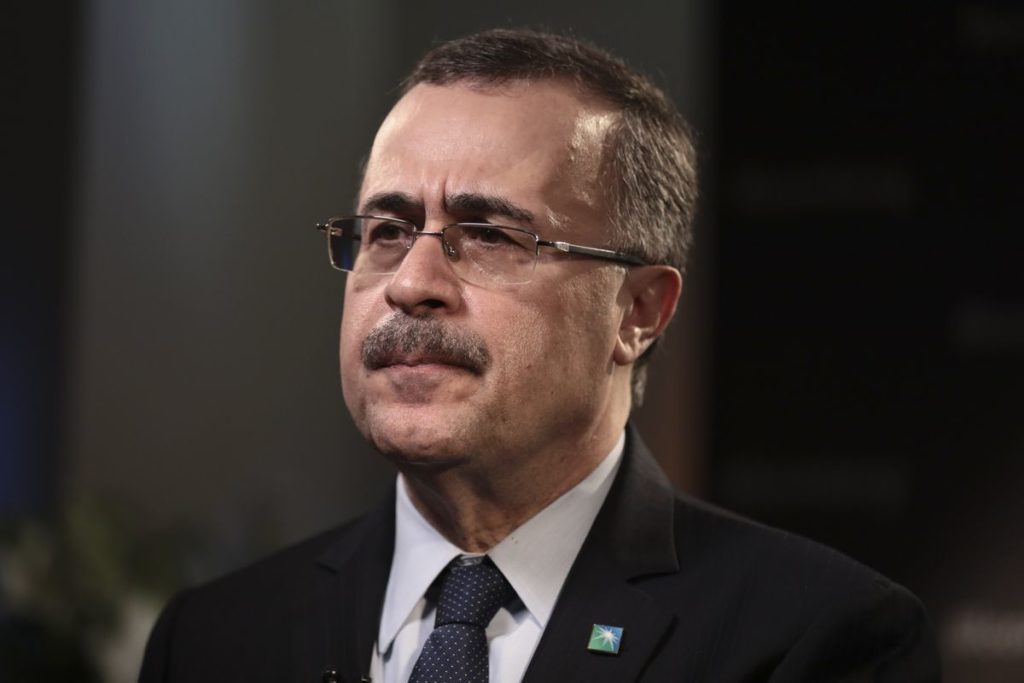
The chief executive of Saudi Aramco, the state-owned oil firm that is seen as the kingdom’s crown jewel, said the company is ready for a local listing on the kingdom’s stock exchange and that it will happen “very soon”.
Amin Nasser declined to say how much of the state-owned oil giant would be listed on the Tadawul exchange.
Reports have emerged that 1% of the company could be sold locally later this year before more is sold on an international market.
“Aramco is ready for listing, whenever the shareholders make the decision to list, and as you heard from his royal highness Prince Abdulaziz yesterday, it’s going to be very soon, so we are prepared,” Mr Nasser said, referring to the new Saudi energy minister.
Mr Nasser spoke to reporters on the sidelines of an energy conference in Abu Dhabi.
“That’s the bottom line,” he added.
Saudi Crown Prince Mohammed bin Salman first announced plans for an initial public offering of the company in 2016, saying up to 5% of the company would be sold publicly.
The government has since delayed the timing of the IPO, most recently to finalise a deal that saw Aramco acquire a nearly 70 billion US dollar stake in Saudi petrochemicals firm Sabic.
The crown prince has valued Aramco at two trillion US dollars, but analysts estimate it could be worth closer to 1.5 trillion US dollars.
Even at that lower end, a partial listing of Aramco would potentially be the world’s biggest IPO ever.
An Aramco listing is a key part of the crown prince’s efforts to diversify the kingdom’s oil-driven economy.
Prince Mohammed plans to transfer funds from Aramco to the sovereign wealth fund and use those earnings, from investments abroad, to support large-scale local development projects that can create millions of jobs for young Saudis.
Diversification efforts are seen as the kingdom’s top priority as oil trades around 60 US dollars a barrel, below the 80-85 US dollar range needed to cover government spending.
The International Monetary Fund said Monday that unemployment remains high at 12.5%, with the economy projected to grow 1.9% this year.
The international lender also projected the kingdom’s budget deficit to widen, even as the government pushes ahead with sweeping economic reforms.
The Ministry of Finance issued a statement saying that while it agrees with the IMF’s projections of the economic outlook over the medium term, it differs with the expected budget deficits estimated by the report.
In recent days, momentum has picked up toward an Aramco IPO.
Last week, Aramco named the finance-minded Yasir al-Rumayyan as its new board chairman.
Mr Al-Rumayyan heads the country’s sovereign wealth fund and is a close adviser of the crown prince.
He replaced Khalid al-Falih, who was the kingdom’s energy minister until early on Sunday.
Analysts have said removing Mr al-Falih as board chairman would help give an appearance of a separation between the government and the operations of Aramco as a company that makes its own decisions based on business conditions rather than purely government interests.
Still, production guidelines for the company will come from the energy ministry, Mr Nasser told reporters.
In a step toward a possible listing, Aramco this year gave a rare glimpse into its financials, revealing net profits of 111 billion US dollars and revenue close to 356 billion US dollars for 2018, making it the world’s most profitable company that year.
New Saudi energy minister Prince Abdulaziz bin Salman on Monday also expressed support for efforts to distance the government from Aramco in his first public debut since being named to the post a day earlier.
“I think the best thing we have done in Saudi Arabia was to ensure the commerciality of the company and so-called arm’s length relationship… as a company owned by the state and enabling the company to work as nothing more than any international company,” he said at the World Energy Congress in Abu Dhabi.
“The IPO really made us all focus on even exerting and accelerating every possible effort to highlight this,” the prince said.
Prince Abdulaziz enters the job as an experienced oil industry insider and as a familiar face among Opec member-states.
He is an older half brother of the crown prince and a son of King Salman.